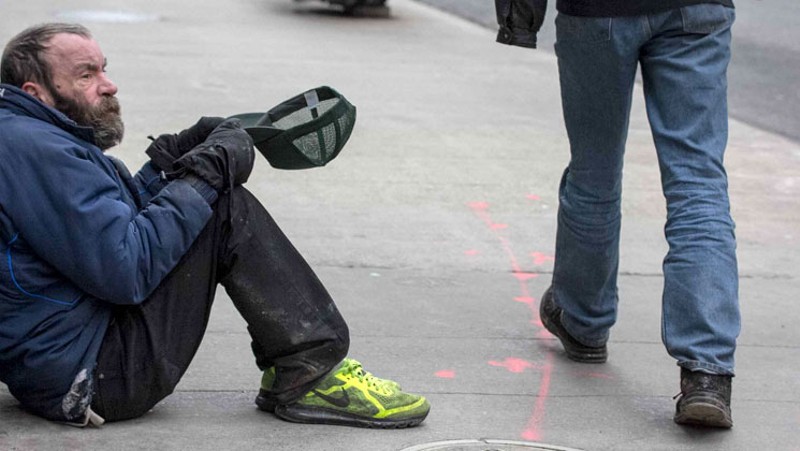Districts 11, 12 and 14 had the most panhandling service requests last year, according to a presentation scheduled to be given to City Council on Wednesday about how to handle panhandlers.
“It’s really just been problematic for a lot of my neighbors and folks that live in this neighborhood," said Lee Kleinman, District 11's councilman. "It’s not without compassion. The folks that live here want to help homeless [populations] and want to get them into shelters and into permanent housing, but they’re also kind of losing tolerance of the aggressive behavior.”
According to the presentation, courts have said that asking for help, including asking for money, is protected speech under the First Amendment. This makes it hard to ban “aggressive panhandling,” to prohibit the activity in specific areas and times or to require panhandlers to obtain solicitation permits.
What Dallas can do, though, is enforce the existing ordinances and state law, modify some of those ordinances and adopt new ones, and implement more supportive solutions.
The city is looking into strategies that won't put them in legal hot water with the panhandlers.
The Dallas Police Department cites and arrests panhandlers. The community courts help these individuals with their citations, address their criminal offenses and connect them to services that assist with homelessness, unemployment, substance abuse and mental illness.
The Dallas Marshal’s Office is developing a program at the city’s detention center that would link people with services as well. The Office of Community Care started the End Panhandling Now initiative in 2018 to provide social services to panhandlers and discourage the public from giving them money.
Some panhandle to fulfill basic needs like food and shelter or because they're homeless or mentally ill and can’t hold a job or get connected to the right social services.
Others do it because they can make up to $300 a day.
“I’ve seen homeless folks that pull a wad of money out of their pocket and say ‘Why would I leave this corner when I’m making this kind of money?’” Kleinman says.
The city can regulate illegal activity associated with panhandling like littering, impeding traffic or urinating and defecating in public. More broad solicitation ordinances that are narrowly tailored and content-neutral may be constitutionally sound, as long as there is compelling government interest.
But, criminalizing panhandling may make the problem worse because it leads to unpaid citations and outstanding warrants that, in the end, make it harder for individuals to obtain housing or employment.
Dallas is considering strategies that tackle the root causes of panhandling and looking into different approaches being tested out across the country.
Other cities, such as Albuquerque and Philadelphia, have started programs that allow would-be panhandlers to work for the city and earn a daily wage. These programs also link the individuals with social services. Instead of begging for money, individuals would participate in community beautification services.
In 2015, Albuquerque allocated $50,000 to a local hospitality center to launch the There's A Better Way Program. As part of the program, a city employee heads out at 7 a.m. each morning, driving around to pick up would-be panhandlers to offer them a day's work, according to Bloomberg. The individuals picked up are paid $9 an hour, a little more than the city's minimum wage. They're usually picking up trash or clearing weeds. The city donated the van and the $50,000 pays the driver's and the workers' wages.
The people who are picked up are not required to show ID or fill out any forms. Throughout the day, they're fed lunch and snacks and provided water. In about a year's time, the program provided 932 day-long shifts to 302 homeless individuals, according to Bloomberg.
Some are also using technology to help people give directly to panhandlers. A program that utilizes an app called Samaritan provides qualified individuals with a key fob that acts as a smart wallet. Through the Samaritan app, people can donate money to would-be panhandlers. The funds can only be used to pay for certain things, like food, at partnering businesses. To spend the money on anything else, the individual has to get it approved by a counselor.
Wayne Walker, OurCalling's executive director and pastor, says his organization was approached about participating in the rollout of the Samaritan app in Dallas. The problem is, he says, all the things that people are allowed to buy through the app are already free through other service providers in the city. OurCalling has had an app (found here) for years that helps people donate and volunteer to put a dent in homelessness. "If people would use that app, it'll help people get off the streets," Walker says.
He says he meets many people who are destroying their lives with the money they get passed out of car windows. It fuels drug and sex trafficking, Walker says. He’s personally met with thousands of people experiencing homelessness in the last 20 years in Dallas. Out of all of them, only one person paid his rent and his car note with panhandling money. He said any form of panhandling, digital or in person, is not the most productive way to get people off the streets.
Other proposals include allowing people to buy vouchers to give to panhandlers which can be redeemed for shelter, transportation and other necessities, and modifying the physical environment to discourage panhandling.













